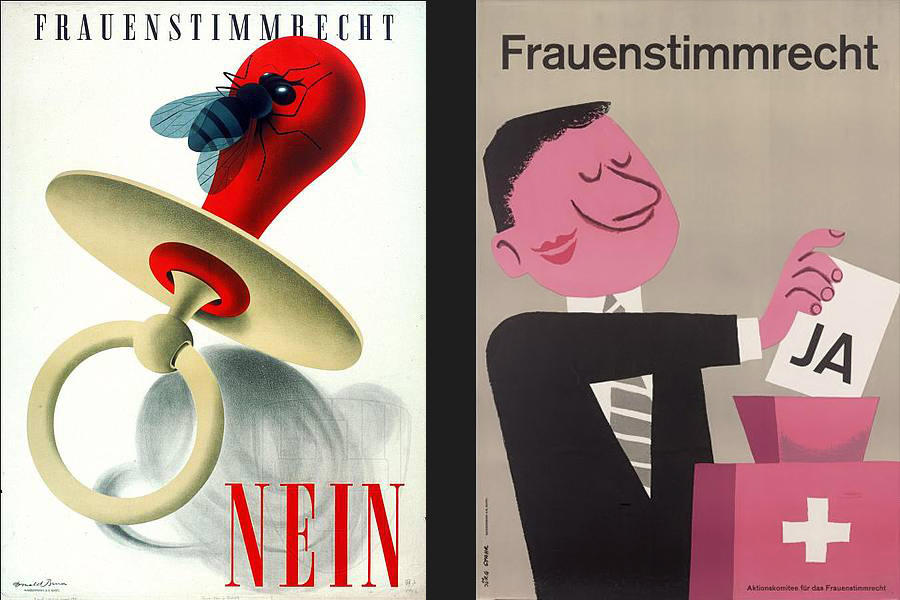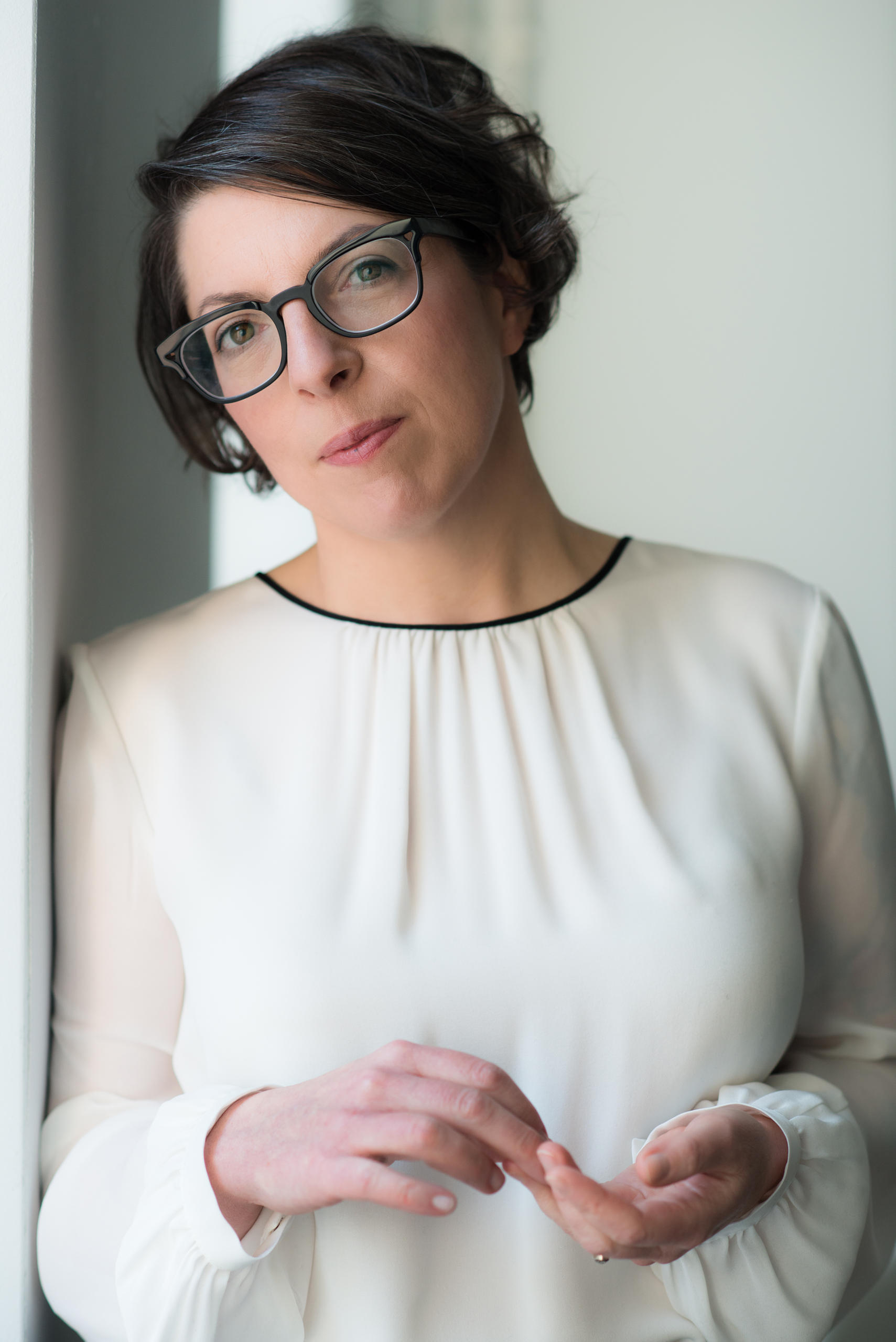
Swiss women’s ‘absurd’ struggle hits the big screen

Switzerland’s women didn’t win the right to vote until 1971, which isn’t usually considered a laughing matter. But a new film puts a comedic spin on Swiss suffrage to make a point about the patriarchy of the time.
“The world was changing in 1971,” a voice narrates over footage of protests in the late 1960s. Cut to a shot of an idyllic Swiss town.
“But here, it was as though it had stood still.”
Women aren’t allowed to work without their husband’s permission, young women can land in prison for romantic relationships outside marriage and the man of the house holds on to the money. The Switzerland portrayed in the film “The Divine Order” is no paradise.
The film’s story is told by a housewife and mother who becomes active in the women’s suffrage movement in her small town. But small encounters throughout make it clear the real story is about the Swiss patriarchy under which men, women and children all suffer.
‘Women in politics goes against the divine order’
Though hard to believe, many of the events that come up in the film actually happened. The imprisonment of young people for “licentious behaviour” or “unwillingness to work” was a dark chapter in Swiss history.
Swiss director and scriptwriter Petra Volpe did careful research before producing “The Divine Order”. She dug through archives and talked to Swiss suffragists as well as women who were opposed to voting rights at the time, of which there were several. Then, Volpe had a historian look over her script in order to “guarantee the right atmosphere” for the film.
She describes that atmosphere as “constrained“. At the time, gender roles were very rigid. “Women in politics goes against the divine order,” one female opponent of women’s suffrage says in the film.
The forced female vote
Volpe’s film will hit Swiss cinemas on International Women’s Day, which she considers symbolic. To her, March 8 is a celebration of gender equality, and the biggest success of the day’s hundred-year history is unquestionably the introduction of women’s suffrage in nearly all of the world’s democracies.Outsiders often wonder what took Switzerland so long. Volpe has her own explanation.
“Switzerland is a conservative country and there is a lot of resistance against change.”
Volpe doesn’t accept excuses like the fact that men had to vote to let women have a voice or that women’s suffrage was not ordered by the central government, as in many other places.
While surrounding countries had known women’s suffrage for a long time, women in Switzerland continued not to be taken seriously by their politicians. Petitions and motions just disappeared into cabinet members’ desk drawers, she says.
The filmmaker is convinced that women would have won the right to vote much earlier in Switzerland if the government had sent other signals.
Issues that still resonate
Despite its setting, Volpe insists her film isn’t just meant for a Swiss audience. To the Italian-Swiss dual citizen who has lived in Berlin and the United States, outside perspectives were important.

“I wanted to tell a Swiss story in a way that would be interesting to everyone,” she says.
The strategy appears to have worked: a Danish distributor saw the film and found it globally marketable. The rights have already been sold to China and several other countries.
Volpe attributes the international interest to the fact that its central theme involves women’s rights.
“It’s about courage, democracy, equal treatment and the fight for justice. After the elections in the US, those issues have become incredibly current once again.”
And what about Switzerland?
“There’s still an incredible amount to accomplish,” she says without hesitation. “Women still earn less than men in Switzerland. But the bigger issue is that we have all internalised a deep-seated sexism.”
Timeline: the long road to women’s suffrage
1868: Zurich women unsuccessfully call for suffrage on the occasion of a cantonal constitutional revision
1957: A revision of the civil protection law is set to include a requirement that women participate. Women’s groups resist, arguing they don’t yet have the right to vote. The government quickly puts together a draft law introducing women’s suffrage to save the civil protection project.
1959: Women’s right to vote is turned down at the ballot box with 67% against.
1963: Switzerland joins the Council of Europe but cannot join the European Human Rights Convention because of the lack of women’s suffrage. In 1969, the cabinet launches a new referendum.
1971: Male citizens vote to introduce women’s suffrage with 66% in favour.
1990: Canton Appenzell Inner Rhodes becomes the last canton to introduce women’s suffrage at the local level after being forced to do so by a federal court order.
Three questions for filmmaker Petra Volpe
swissinfo.ch: How did you decide on the topic of women’s suffrage?
Petra Volpe: My producer had the idea, which I immediately found compelling and fruitful.
swissinfo.ch: Why did you decide to make a comedy rather than a documentary like the British film ‘Suffragette’, for example?
P.V.: Women got the right to vote in Switzerland in 1971. That is so absurd that it had to be a comedy. As a woman, you need a lot of dark humor in life.
swissinfo.ch: Much of the film could seem cliché or overdone to outsiders.
P.V.: People often say that about women’s issues: that’s exaggerated, or old news. But much of what is said in the film is original material said at the time.
Translated from German by Veronica DeVore

In compliance with the JTI standards
More: SWI swissinfo.ch certified by the Journalism Trust Initiative






























You can find an overview of ongoing debates with our journalists here . Please join us!
If you want to start a conversation about a topic raised in this article or want to report factual errors, email us at english@swissinfo.ch.